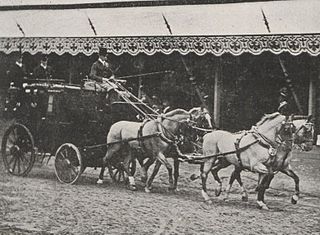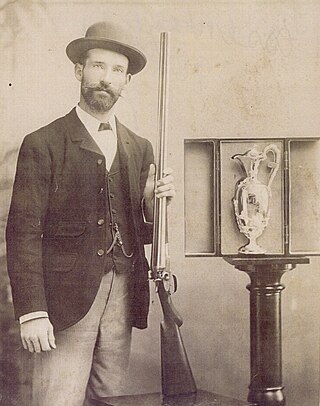
The 1900 Summer Olympics, today officially known as the Games of the II Olympiad and also known as Paris 1900, were an international multi-sport event that took place in Paris, France, from 14 May to 28 October 1900. No opening or closing ceremonies were held.

The 1900 Summer Olympics were held as part of the 1900 World's Fair, during which many cycling events were contested. The IOC website currently affirms a total of 3 medal events, after accepting, as it appears, the recommendation of Olympic historian Bill Mallon regarding events that should be considered "Olympic". These additional events include the men's points race. Thus, three cycling events are considered Olympic events. These three competitions were held between 9 September and 16 September 1900. The cycling part of the World's Fair included 250 competitors, 160 of them French. In the sprint and 25 km events, 72 competitors, all men, from seven nations competed.
At the 1900 Summer Olympics, five equestrian events were contested. The competition was held from 29 May to 2 June at the Place de Breteuil in the 7th arrondissement of Paris, as part of the Exposition Universelle in Paris. The equestrian events were organised by the Société Hippique Française and titled as the Concours Hippique International, with competitors from eight countries competing in three jumping and two driving events.

At the 1900 Summer Olympics, a Basque pelota tournament was contested.

At the 1900 Summer Olympics in Paris, four events in rowing were contested, marking the introduction of the sport to the Olympic program. At the inaugural 1896 Games, the rowing competition was cancelled due to strong winds. The 1900 regatta was held on the Seine between the Courbevoie Bridge and the Asnières Bridge on 25 and 26 August. The length of the regatta course was 1,750 metres. Two finals were held in the coxed four competition, with both finals being considered Olympic championships. Thus, there were a total of five rowing championships awarded.

At the 1900 Summer Olympics in Paris, seven swimming events were contested. Only men competed in the swimming competition. There was a total of 76 participants from 12 countries competing. The games are referenced in Yann Martel's 2001 novel Life of Pi. As with the rowing events, swimming took place on the Seine between the Courbevoie Bridge and the Asnières Bridge.
The 1900 Summer Olympics were held in Paris, France, from May 14 to October 28, 1900, as part of the 1900 World's Fair.

The men's marathon was a track & field athletics event at the 1900 Summer Olympics in Paris. It was held on July 19, 1900. 13 athletes from five nations competed in the marathon, which used a distance of 40.26 kilometres.

Belgium competed at the 1900 Summer Olympics in Paris, France. It was the first appearance of the European nation. Belgium was represented in France by 78 athletes, all of them male, who competed in 11 disciplines. They comprised 95 entries in 28 events.

Australia competed at the 1900 Summer Olympics in Paris, France. Most Olympic historians keep Australian records at early Olympics separate from those of the United Kingdom despite Australia's lack of independence at the time.

The men's 20 metre rapid fire pistol was one of the competitions in the 1900 Summer Olympics shooting events in Paris. It was held from August 1 to August 4, 1900. Six athletes from 2 nations competed. This event was contested for prize money by professionals. It is no longer included in the International Olympic Committee website's database of Olympic medal events. Five of the six shooters were from France; the host nation swept the medals as Maurice Larrouy won with Léon Moreaux second and Eugène Balme third.

The men's individual competition with free revolver event was one of the competitions in the Shooting at the 1900 Summer Olympics events in Paris. It was held on 1 August 1900. 20 shooters from 4 nations competed, with five shooters per nation. Medals were given for individual high scores, and the scores of the five shooters were summed to give a team score for the team event. The target designed for this competition is still being used today. The event was won by Karl Röderer of Switzerland, with his countryman Konrad Stäheli taking bronze. Between them was Achille Paroche of France with silver.

The men's 25 kilometres was one of three cycling events, all track cycling, on the Cycling at the 1900 Summer Olympics programme that were open to all amateurs, had more than one nation participating and no handicapping. It was held on 15 September. Ten cyclists competed. Four had already competed in the sprint event. The result of the race proved Louis Bastien of France to be the top long-distance cyclist present, while Louis Hildebrand finished in second and Auguste Daumain in third. One of the contestants, Louis Trousselier, would go on to win the 1905 Tour de France. Prizes were awarded to the top four finishers: art objects valued at 400 francs, 300 francs, 200 francs (third), and 100 francs (fourth).
Pigeon racing was contested at the 1900 Olympic Games in Paris. It is known that there were seven events on the 1900 Olympic Games schedule. These events have generally not been classified as official, although the IOC has never decided which events were "Olympic" and which were not.

The "hacks and hunter combined", also known as the "chevaux de selle", was an equestrian event at the 1900 Summer Olympics. It is unknown how many riders competed. The top four placers are known, as are about half the remaining riders who competed, including three women. As an upper limit, 50 men and 1 woman are listed as entrants in the Official Report, but it is almost certain that not all actually competed.

The four-in-hand "mail coach" driving was an equestrian event at the 1900 Summer Olympics. There were 31 entrants listed for the event; all 28 of them are known by name. The event was won by Georges Nagelmackers of Belgium. Silver went to Léon Thome and bronze to Jean de Neuflize, both of France.

The 50 metre team free pistol event was one of the competitions in the Shooting at the 1900 Summer Olympics events in Paris. It was held on 1 August 1900. 20 shooters from 4 nations competed, with five shooters per team. Medals were given for individual high scores, and the scores of the five shooters were summed to give a team score. The winning team was from Switzerland; silver went to France and the Netherlands took bronze.

Donald Mackintosh was an Australian professional sports shooter. He shot on the European live-bird circuit between 1896 and 1908, winning numerous prizes and recognition as a world champion. In 1992, he was posthumously awarded Olympic gold and bronze medals for pigeon-shooting events deemed to form part of the 1900 Summer Olympics. However, the International Olympic Committee (IOC) later reversed its decision and reclassified the events as non-Olympic.














